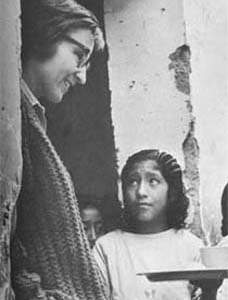
Aidan Delgado, son of an RPCV, believes that the absence of any real understanding of Arab or Muslim culture by most G.I.'s, combined with a lack of proper training and the unrelieved tension of life in a war zone, contributes to levels of fear and rage that lead to frequent instances of unnecessary violence. Mr. Delgado's background is unusual. He is an American citizen, but because his father was in the diplomatic corps, he grew up overseas. He spent eight years in Egypt, speaks Arabic and knows a great deal about the various cultures of the Middle East
From 'Gook' to 'Raghead'
By BOB HERBERT
Published: May 2, 2005
I spent some time recently with Aidan Delgado, a 23-year-old religion major at New College of Florida, a small, highly selective school in Sarasota.
On the morning of Sept. 11, 2001, before hearing anything about the terror attacks that would change the direction of American history, Mr. Delgado enlisted as a private in the Army Reserve. Suddenly, in ways he had never anticipated, the military took over his life. He was trained as a mechanic and assigned to the 320th Military Police Company in St. Petersburg. By the spring of 2003, he was in Iraq. Eventually he would be stationed at the prison compound in Abu Ghraib.
Mr. Delgado's background is unusual. He is an American citizen, but because his father was in the diplomatic corps, he grew up overseas. He spent eight years in Egypt, speaks Arabic and knows a great deal about the various cultures of the Middle East. He wasn't happy when, even before his unit left the states, a top officer made wisecracks about the soldiers heading off to Iraq to kill some ragheads and burn some turbans.
"He laughed," Mr. Delgado said, "and everybody in the unit laughed with him."
The officer's comment was a harbinger of the gratuitous violence that, according to Mr. Delgado, is routinely inflicted by American soldiers on ordinary Iraqis. He said: "Guys in my unit, particularly the younger guys, would drive by in their Humvee and shatter bottles over the heads of Iraqi civilians passing by. They'd keep a bunch of empty Coke bottles in the Humvee to break over people's heads."
He said he had confronted guys who were his friends about this practice. "I said to them: 'What the hell are you doing? Like, what does this accomplish?' And they responded just completely openly. They said: 'Look, I hate being in Iraq. I hate being stuck here. And I hate being surrounded by hajis.' "
"Haji" is the troops' term of choice for an Iraqi. It's used the way "gook" or "Charlie" was used in Vietnam.
Mr. Delgado said he had witnessed incidents in which an Army sergeant lashed a group of children with a steel Humvee antenna, and a Marine corporal planted a vicious kick in the chest of a kid about 6 years old. There were many occasions, he said, when soldiers or marines would yell and curse and point their guns at Iraqis who had done nothing wrong.
He said he believes that the absence of any real understanding of Arab or Muslim culture by most G.I.'s, combined with a lack of proper training and the unrelieved tension of life in a war zone, contributes to levels of fear and rage that lead to frequent instances of unnecessary violence.
Mr. Delgado, an extremely thoughtful and serious young man, balked at the entire scene. "It drove me into a moral quagmire," he said. "I walked up to my commander and gave him my weapon. I said: 'I'm not going to fight. I'm not going to kill anyone. This war is wrong. I'll stay. I'll finish my job as a mechanic. But I'm not going to hurt anyone. And I want to be processed as a conscientious objector.' "
He stayed with his unit and endured a fair amount of ostracism. "People would say I was a traitor or a coward," he said. "The stuff you would expect."
In November 2003, after several months in Nasiriya in southern Iraq, the 320th was redeployed to Abu Ghraib. The violence there was sickening, Mr. Delgado said. Some inmates were beaten nearly to death. The G.I.'s at Abu Ghraib lived in cells while most of the detainees were housed in large overcrowded tents set up in outdoor compounds that were vulnerable to mortars fired by insurgents. The Army acknowledges that at least 32 Abu Ghraib detainees were killed by mortar fire.
Mr. Delgado, who eventually got conscientious objector status and was honorably discharged last January, recalled a disturbance that occurred while he was working in the Abu Ghraib motor pool. Detainees who had been demonstrating over a variety of grievances began throwing rocks at the guards. As the disturbance grew, the Army authorized lethal force. Four detainees were shot to death.
Mr. Delgado confronted a sergeant who, he said, had fired on the detainees. "I asked him," said Mr. Delgado, "if he was proud that he had shot unarmed men behind barbed wire for throwing stones. He didn't get mad at all. He was, like, 'Well, I saw them bloody my buddy's nose, so I knelt down. I said a prayer. I stood up, and I shot them down.' "
E-mail: bobherb@nytimes.com









